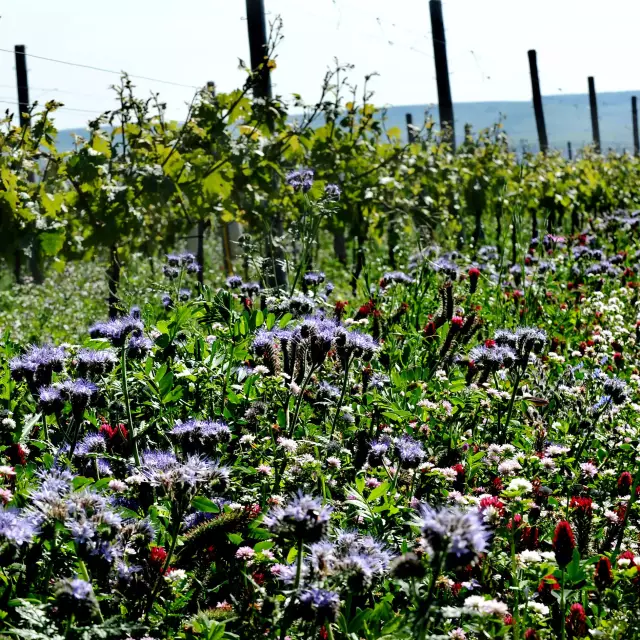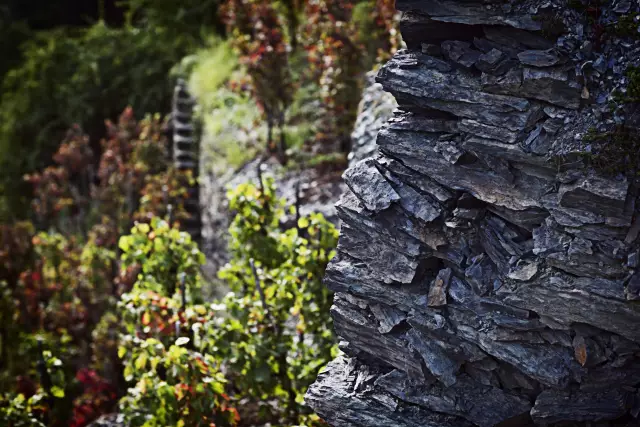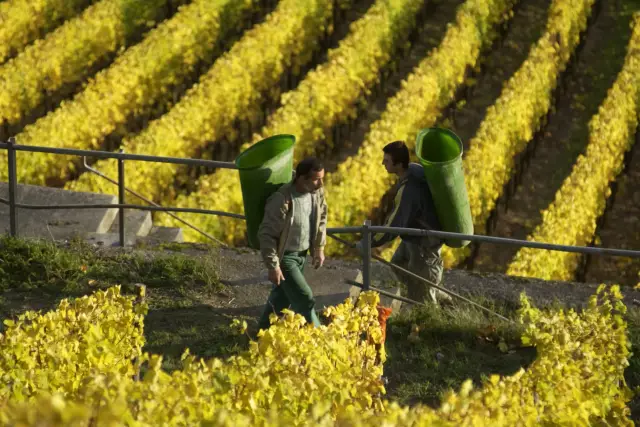Organic cultivation

The area under organic viticulture has more than tripled in the last ten years. Around 9,300 hectares of vineyards (2018) are cultivated organically, which is about 9% of the total vineyard area.
Facts
-
9 %
of the total area
Organic Viticulture in Germany
Organic viticulture has now become firmly established in Germany after almost 40 years. In 2021, around 12,500 hectares of vineyards were cultivated organically throughout the country. This corresponds to a fivefold increase in the organic area since 2004 and a share of around twelve percent of the total German vineyard area.
How does organic viticulture work?
Numerous wineries have noticed an improvement in the quality of their wines as a result of switching to organic wine production. Often the conversion to organic viticulture takes place on vineyards with the change of generations. However, many wineries do not publicise their organic cultivation methods - for example, through certification - because they take such practices for granted.
In organic viticulture, the goal is to maintain a balanced ecosystem in the vineyard and to promote biodiversity. To this end, the application of all synthetic chemical pesticides are excluded, as are artificially produced fertilisers and herbicides. As a result, no mineral fertilisers are used but only humus, compost or other organic nutrient sources, and for plant protection, only pure sulphur or baking powder (sodium bicarbonate) and copper are applied to treat powdery and downy mildew. In addition, attempts are made to increase the resistance of the vines with plant strengthening agents. Weeds in the vineyard are removed only mechanically, i.e. without chemical herbicides. In order to keep soil life and biodiversity in the vineyards as active as possible, all organically cultivated vineyards are also planted with a wide variety of plants between the rows of vines. The conversion phase from conventional to organic viticulture takes three years.
For some years now, there has been a trend in German viticulture towards biodynamic growing. It already has a share of about ten percent of organic viticulture. Biodynamic vineyards make even greater use of the forces of nature and are guided by the teachings of the anthroposophist Rudolf Steiner.
EU Regulation on Organic Wine
Since the 2012 vintage, an EU regulation has been in force that regulates not only the external management in the vineyard, but also the technical preparation of organic wines in the cellar. It specifies, for example, lower limits for the maximum sulphur content for organic wines compared to conventionally produced wines. In addition, some wine treatment products are banned, some must be of organic origin, and any genetic engineering, for example in the yeasts, is forbidden. Wines that have been produced according to these EU regulations by certified wineries can be called organic wine, eco-wine, or bio-wine. They can be recognised by the EU Community logo.
About half of the certified organic wine producers are also members of one of the organic associations, some of which prescribe further criteria for their membership. The most important associations for organic viticulture are Ecovin, Bioland, Naturland, and for biodynamically working wineries, Demeter and Respekt Biodyn, whose logos can also be found on the label. Founded in 1985, Ecovin is the largest association of organic wineries in the world. In 2022, the approximately 250 member wineries cultivated more than 2,700 hectares of vineyards in twelve German winegrowing regions.
Environmentally friendly viticulture is standard in Germany
After being pioneers in viticulture for a long time, many methods of organic viticulture are now standard in conventional viticulture. These include, for example, the cultivation of fungus-resistant grape varieties (PiWis), the use of beneficial insects for pest control, the greening of the vine rows or the effort to maintain the ecological balance in the vineyard. Because organic viticulture places great emphasis on soil fertility and usually results in lower yields, organic wines often reflect quite well the characteristics of the soil and climate in which the grapes were grown. Nevertheless, they cannot be distinguished in terms of taste from wines of equivalent quality grown conventionally. Since many years, conventional viticulture has also incorporated concepts from organic viticulture, particularly in plant protection and fertilisation, according to the motto "as much as necessary, but as little as possible".
Pheromones
Pheromones are now used to control the grape berry moth on more than half of German vineyards - in both organic and conventional viticulture. These are sexual scents of the female grape berry moth that normally attract the males. The artificially produced, highly concentrated pheromones are hung out in ampoules in the vineyard and attract males according to the so-called "confusion method", so that they no longer find the female grape berry moth. In this way, the reproduction of the grape berry moth can be greatly reduced.
Do organic winegrowers use other grape varieties?
The range of grape varieties used by organic winegrowers does not differ significantly from that of other winegrowers. However, they more often use grape varieties that are resistant to fungal diseases. Every year, the area under cultivation of fungus-resistant grape varieties - PIWIs for short - increases in Germany. PIWIs include Cabernet Blanc, Solaris, Souvignier Gris, Muscaris, Regent, Cabernet Cortis, Calardis Blanc, Laurot, Satin Noir and Sauvignac. More about PIWIs.
Buying organic wine
Organic wines are now well distributed in Germany and have a firm place in consumers' shopping baskets. You can find them in organic specialist shops, of course, but also in general wine shops or supermarkets. Of course, they are also available directly from the winegrower or from some winegrowers' cooperatives that cultivate part of their vineyards organically. Because the taste of wine is the most important thing when buying wine, organic is often an added benefit that people are happy to take along with them in order to support environmentally friendly wine production.
Everything under control
Producers who want to label and market their agricultural products as organic have to undergo a control procedure according to the EU organic wine directive. All certified farms are inspected once a year by an independent inspection body to determine whether they have complied with the respective required conditions. If they belong to an organic winegrowers' association, they are also subject to a further inspection to ensure that they comply with the valid, even stricter guidelines of the association.
Who carries out more treatments with plant protection products - organic or conventional winegrowers?
The organic winemaker! The active ingredients act preventively and adhere only to grapes and leaves instead of penetrating the vine's system. This protective layer must be renewed frequently due to external influences.




